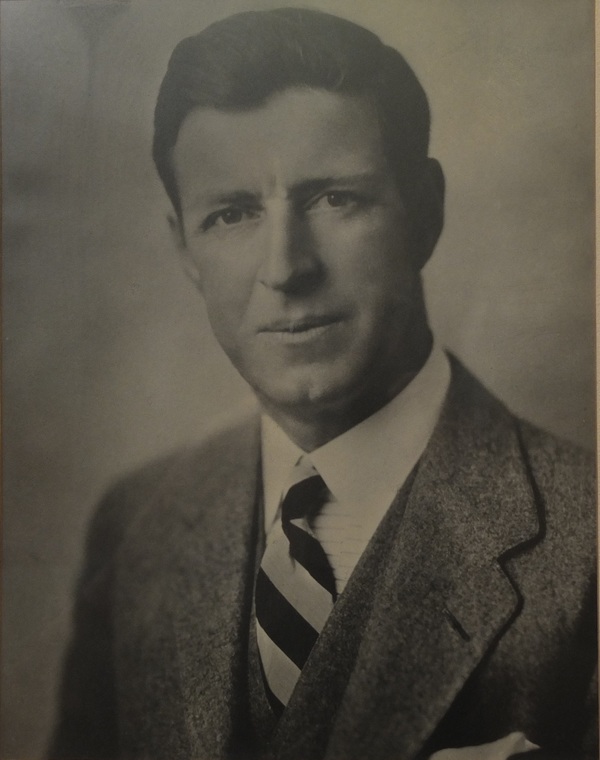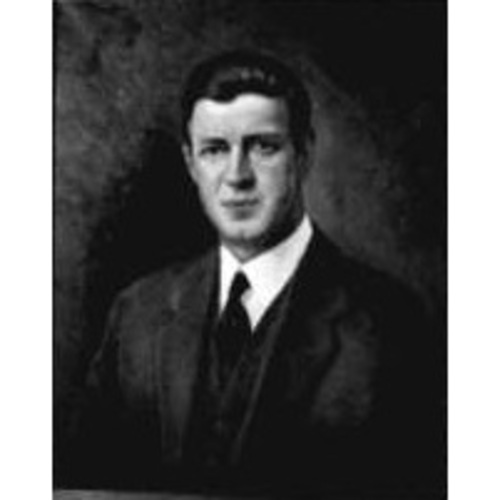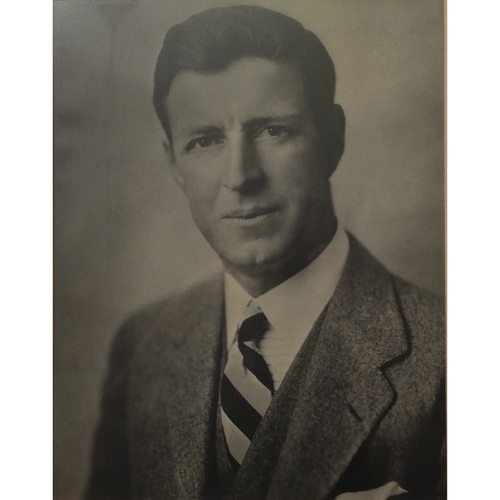
Source: Link
CROMIE, ROBERT JAMES, secretary and newspaper publisher; b. 4 July 1887 in Scotstown, Que., son of Henry James Cromie of Ireland and Sarah Ann Guy of Australia; m. 6 Sept. 1911 Bernadette Grace Mcfeely in Vancouver, and they had four sons and a daughter; d. 11 May 1936 in Oak Bay, B.C.
Educated in public schools in the Eastern Townships, Robert James Cromie travelled to Winnipeg as a teenager, and found work there as a junior office boy with the wholesale grocery firm Foley, Lock, and Larson. In 1906, while employed as a bellhop at the Mariaggi Hotel, he met and impressed John William Stewart, a railway-construction contractor with connections to the Liberal Party. The following year, after holding a variety of jobs and taking business classes at night school, Cromie was hired as Stewart’s personal secretary (assistant) at Foley, Welch, and Stewart in Vancouver. The partnership, reorganized in 1907, was one of the largest railway-construction companies in North America and was involved in many of the major projects in British Columbia.
In 1917, in a bid to wield political influence in the provincial election, Stewart took control of a bankrupt Liberal newspaper, the Vancouver Daily Sun, and put Cromie in charge. The paper had been established in 1912 with backing from business interests associated with the party, including that of Frederick Coate Wade*. John Pollock McConnell and Richard Samuel Ford, publishers of the weekly B.C. Saturday Sunset, had launched the daily, dubbed the Sun, on 12 February as competition with the Vancouver Daily Province [see Walter Cameron Nichol*], the Vancouver Daily News-Advertiser, and the Vancouver World. McConnell and Ford departed in 1915 and Wade headed another group that purchased the Sun. Under his direction, the paper slid into receivership. After Cromie replaced Wade two years later, he turned out to have a natural genius for the business, and he soon acquired the paper from Stewart, probably in August 1917, under circumstances that are not clear.
On 1 September, with money borrowed from Clarence Brettun Blethen, publisher of the Seattle Daily Times, Cromie bought out the News-Advertiser, founded in 1886. He absorbed its circulation and quickly appropriated its history, claiming that the takeover made the Sun Vancouver’s oldest newspaper. Dropping the evening edition, he began publishing in the morning. The paper’s readership jumped from 10,000 to 17,000, and less than a year later, its Sunday edition was selling more than 25,000 copies.
On 11 March 1924, for $475,000, Cromie purchased the Vancouver Daily World from Charles Edwin Campbell, an entrepreneur who had owned it since 1921. Cromie later converted the World into the Vancouver Evening Sun, whose circulation reached 47,000 and topped 50,000 on Sundays in less than a decade. The almost fivefold increase in readership was a remarkable business turnaround, but it was not achieved without difficulty. When Cromie had trouble meeting a deadline to pay $135,000 he still owed Campbell, his creditor threatened to seize the Sun. According to newspaper historian Charles Tory Bruce, the irrepressible Cromie made “an emotional appeal” to Frederick Neal Southam, vice-president of Southam Limited [see William Southam], owner of the Province, Cromie’s last major competitor in the Vancouver market. Southam was sufficiently impressed by the brash young publisher’s enthusiasm to advance the funds. Bruce relates that the Province subsequently held third-mortgage bonds on the Sun for several years. Early in January 1926 Cromie dropped the morning edition completely.
Cromie next embarked upon a campaign to make the Sun, whose name would vary over the years, an authoritative voice in western Canada. Curious and energetic, he did not hesitate to seek advice wherever he could find it. Russell R. Walker, a reporter for the Province, recalled that shortly after taking over the Sun, Cromie had visited the Legislative Assembly’s press gallery in Victoria one night, sat down beside him, and asked frankly what his journalistic foe thought Cromie could do to resurrect his struggling paper. Rather cryptically, Walker said, “Peace River.” Cromie was disappointed and not impressed with Walker’s explanation later that same evening that the paper needed a cause, but he turned the remark over in his mind. In 1928 he began a successful circulation-building crusade for investment in the province’s remote north, calling it “the greatest undeveloped resource in North America.” Widely travelled in Europe and the Far East, he foresaw the economic rise of the United States and the growing importance of Asian markets. His newspaper campaigned for causes such as reductions in rates for cable communication with the Orient, the development of a western grain route that would link prairie producers to Pacific markets, the equalization of grain-transportation rates, the establishment of Vancouver as the distribution base for western Canada, rail connections between the Peace River district and the coast, and greater investment in the province’s mining industry.
A promoter of Technocracy, a movement founded in 1918–19 in the United States which advocated replacing politicians with qualified scientists and engineers who had the technical expertise to bring about economic stability, Cromie corresponded frequently with one of its leaders, Howard Scott. Flamboyant, eccentric, and visionary, Cromie made a strong impact on the people he met. But future prime minister William Lyon Mackenzie King*, writing in his diary in 1920, judged Cromie to be ambitious and “without much conscience or principle, – selfish and irresponsible. A dangerous enemy, a good friend but likely to be a friend only through self-interest.” His opinion did not change over the years. In 1934 he referred to the Sun’s owner as “a traitor blackguard & foul egoist combined.” This view may have been coloured by Cromie’s activities within the Liberal Party, since King noted in 1936 that Cromie was one of “the three men who did their utmost to get me out of the party.” Yet Cromie was also known for his generosity and magnanimity, especially towards his employees.
Cromie was a keen fan of all sports, a health enthusiast, and one of Vancouver’s first joggers. He had visited Japan, China, and India in 1929, attended the World Monetary and Economic Conference in London in 1933, toured Russia by airplane later the same year, and journeyed through the Canadian Arctic by boat and bush plane in 1934. He observed carefully, and wrote and lectured on his findings. A tireless booster of Vancouver and Canada, he was equally comfortable chatting with popular philosopher William James Durant, American president Franklin Delano Roosevelt, or muckraking journalist Lincoln Steffens. During an interview for the Provincial Archives of British Columbia in 1980, his son Donald Cameron Cromie told veteran journalist Peter Stursberg why, in 1934, the Sun gave major play to what has been called Roosevelt’s second New Deal. At a press conference Cromie had asked the president, whom he had come to know when the latter was governor of New York State, to name his social objectives. “Well, Mr. Cromie, nice to see you back from the wilds of British Columbia,” Donald quoted Roosevelt as saying. The president then proceeded to lay out the program’s goals, “all of which had been written out by himself and my father the day before over tea. Nobody ever knew that.” The story has some basis in fact. The press conference actually took place on 7 June 1935, and, according to the transcript, Roosevelt greeted Cromie with “I’m glad to see you back here.” In response to Cromie’s questioning, he then went on to describe his administration’s plans. It has not been possible to determine whether he and Cromie had met the previous day.
Following a trip through the Far East and Australia in 1936, Cromie visited Vancouver Island to deliver a luncheon speech to the Victoria Chamber of Commerce on the modernization of Asia and its significance for the future of the province. He died suddenly on the island of a cardiovascular ailment. He was 48. His widow briefly succeeded him as president and publisher of the Sun, but it was under his son Donald that the newspaper would eventually displace the Province as the leading newspaper in British Columbia and become the largest metropolitan daily issued west of Toronto.
Robert James Cromie is the author of A word picture of Asia, the world’s new market: with observations on world economic and social conditions as they affect Pacific northwest opportunities (Vancouver, 1930); The world in perspective: with observations on world economic and social conditions as they affect Pacific northwest opportunities (Vancouver, 1930); A world perspective ([Vancouver, 1930]); A liberal opinion of Mr. Mackenzie King (Ottawa, [1932?]); Technocracy from the viewpoint of an editor (Girard, Kans., 1933); and The modernization of Asia ([Vancouver, 1936]).
BCA, GR-2951, no.1936-09-513415; GR-2962, no.1911-09-063007. LAC, “The diaries of William Lyon Mackenzie King,” 30 April 1920, 20 April 1934, 12 May 1936: www.collectionscanada.gc.ca/databases/king/index-e.html (consulted 21 Feb. 2011). Vancouver Daily Province, 12, 15 May 1936. Vancouver Sun, 12 May 1936. Charles Bruce, News and the Southams (Toronto, 1968). Electoral history of British Columbia, 1871–1986 ([Victoria, 1988]). The encyclopedia of British Columbia, ed. Daniel Francis (Madeira Park, B.C., 2000). The greater Vancouver book: an urban encyclopaedia, under the dir. of Chuck Davis (Surrey, B.C., 1997). S. W. Jackman, Portraits of the premiers: an informal history of British Columbia (Sydney, B.C., 1969). H. T. Mitchell, “Cromie of the Sun: from bell-hop to newspaper publisher and crusader extraordinary for the Canadian west,” Maclean’s (Toronto), 1 Nov. 1928: 19, 32, 34. Paul Rutherford, The making of the Canadian media (Toronto, 1978). John Woolley and Gerhard Peters, “The American presidency project”: www.presidency.ucsb.edu (consulted 21 Feb. 2011).
Cite This Article
Stephen Hume, “CROMIE, ROBERT JAMES,” in Dictionary of Canadian Biography, vol. 16, University of Toronto/Université Laval, 2003–, accessed March 26, 2025, https://www.biographi.ca/en/bio/cromie_robert_james_16E.html.
The citation above shows the format for footnotes and endnotes according to the Chicago manual of style (16th edition). Information to be used in other citation formats:
| Permalink: | https://www.biographi.ca/en/bio/cromie_robert_james_16E.html |
| Author of Article: | Stephen Hume |
| Title of Article: | CROMIE, ROBERT JAMES |
| Publication Name: | Dictionary of Canadian Biography, vol. 16 |
| Publisher: | University of Toronto/Université Laval |
| Year of revision: | 2016 |
| Access Date: | March 26, 2025 |




